| Listing 1 - 10 of 20 | << page >> |
Sort by
|
Book
ISBN: 9587167961 9789587167962 9789587166958 9587166957 Year: 2014 Publisher: Bogotá : Editorial Pontificia Universidad Javeriana,
Abstract | Keywords | Export | Availability | Bookmark
 Loading...
Loading...Choose an application
- Reference Manager
- EndNote
- RefWorks (Direct export to RefWorks)
Violence --- Violencia --- Reparation (Criminal justice) --- Reparación (Justicia penal) --- Compensation for victims of crime --- Criminal restitution --- Reparation --- Restitution (Criminal justice) --- Restitution for victims of crime --- Remedies (Law)
Book
ISBN: 9004344713 9789004344716 9789004218215 9004218211 Year: 2017 Publisher: Leiden Boston
Abstract | Keywords | Export | Availability | Bookmark
 Loading...
Loading...Choose an application
- Reference Manager
- EndNote
- RefWorks (Direct export to RefWorks)
In Making Manslaughter, Susanne Pohl-Zucker offers parallel studies that trace the legal settlement of homicide in the duchy of Württemberg and the imperial city of Zurich between 1376 and 1700. Killings committed by men during disputes were frequently resolved by extrajudicial agreements during the late Middle Ages. Around 1500, customary strategies of dispute settlement were integrated and modified within contexts of increasing legal centralization and, in Württemberg, negotiated with the growing influence of the ius commune. Legal practice was characterized by indeterminacy and openness: categories and procedures proved flexible, and judicial outcomes were produced by governmental policies aimed at the re-establishment of peace as well as by the strategies and goals of all disputants involved in a homicide case.
Manslaughter --- Reparation (Criminal justice) --- Criminal homicide --- Homicide --- Compensation for victims of crime --- Criminal restitution --- Reparation --- Restitution (Criminal justice) --- Restitution for victims of crime --- Remedies (Law) --- Law and legislation --- History. --- Law and legislation&delete& --- History --- E-books
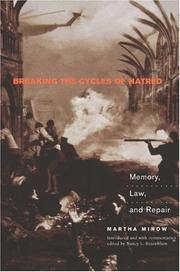
ISBN: 0691096627 0691096635 9786612087677 9786612935305 1282935305 1282087673 1400825385 9781400825387 9780691096629 9780691096636 9781282087675 9781282935303 6612935308 6612087676 Year: 2009 Publisher: Princeton, NJ
Abstract | Keywords | Export | Availability | Bookmark
 Loading...
Loading...Choose an application
- Reference Manager
- EndNote
- RefWorks (Direct export to RefWorks)
Violence so often begets violence. Victims respond with revenge only to inspire seemingly endless cycles of retaliation. Conflicts between nations, between ethnic groups, between strangers, and between family members differ in so many ways and yet often share this dynamic. In this powerful and timely book Martha Minow and others ask: What explains these cycles and what can break them? What lessons can we draw from one form of violence that might be relevant to other forms? Can legal responses to violence provide accountability but avoid escalating vengeance? If so, what kinds of legal institutions and practices can make a difference? What kinds risk failure? Breaking the Cycles of Hatred represents a unique blend of political and legal theory, one that focuses on the double-edged role of memory in fueling cycles of hatred and maintaining justice and personal integrity. Its centerpiece comprises three penetrating essays by Minow. She argues that innovative legal institutions and practices, such as truth commissions and civil damage actions against groups that sponsor hate, often work better than more conventional criminal proceedings and sanctions. Minow also calls for more sustained attention to the underlying dynamics of violence, the connections between intergroup and intrafamily violence, and the wide range of possible responses to violence beyond criminalization. A vibrant set of freestanding responses from experts in political theory, psychology, history, and law examines past and potential avenues for breaking cycles of violence and for deepening our capacity to avoid becoming what we hate. The topics include hate crimes and hate-crimes legislation, child sexual abuse and the statute of limitations, and the American kidnapping and internment of Japanese Latin Americans during World War II. Commissioned by Nancy Rosenblum, the essays are by Ross E. Cheit, Marc Galanter, Fredrick C. Harris, Judith Lewis Herman, Carey Jaros, Frederick M. Lawrence, Austin Sarat, Ayelet Shachar, Eric K. Yamamoto, and Iris Marion Young.
Hate crimes. --- Violence (Law). --- Reparation (Criminal justice) --- Law reform. --- Crimes haineux . --- Violence --- Réparation (Droit) --- Droit --- Réforme --- Hate crimes --- Violence (Law) --- Law reform --- Réparation (Droit) --- Réforme --- Force (Law) --- Compensation for victims of crime --- Criminal restitution --- Reparation --- Restitution (Criminal justice) --- Restitution for victims of crime --- Legal reform --- Bias crimes --- Bias-related crimes --- Hate-motivated crimes --- Hate offenses --- Law --- Remedies (Law) --- Crime
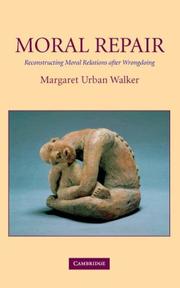
ISBN: 9780521009256 9780521810883 9780511618024 0511249748 9780511249747 9780511250255 0511250258 0511249209 9780511249204 0511618026 0521009251 0521810884 0511248652 1107158958 9781107158955 9780511248658 0511248652 0511318936 9780511318931 128070201X Year: 2006 Publisher: Cambridge Cambridge University Press
Abstract | Keywords | Export | Availability | Bookmark
 Loading...
Loading...Choose an application
- Reference Manager
- EndNote
- RefWorks (Direct export to RefWorks)
Moral Repair examines the ethics and moral psychology of responses to wrongdoing. Explaining the emotional bonds and normative expectations that keep human beings responsive to moral standards and responsible to each other, Margaret Urban Walker uses realistic examples of both personal betrayal and political violence to analyze how moral bonds are damaged by serious wrongs and what must be done to repair the damage. Focusing on victims of wrong, their right to validation, and their sense of justice, Walker presents a unified and detailed philosophical account of hope, trust, resentment, forgiveness, and making amends - the emotions and practices that sustain moral relations. Moral Repair joins a multidisciplinary literature concerned with transitional and restorative justice, reparations, and restoring individual dignity and mutual trust in the wake of serious wrongs.
General ethics --- Reparation (Criminal justice) --- Compensation for victims of crime --- Criminal restitution --- Reparation --- Restitution (Criminal justice) --- Restitution for victims of crime --- Remedies (Law) --- Moral and ethical aspects --- Civil remedies --- Code remedies --- Actions and defenses --- Civil procedure --- Moral and ethical aspects. --- Arts and Humanities --- Philosophy
Book
ISBN: 9780814794661 9780814704974 9780814725276 0814725279 0814794661 0814704972 Year: 2012 Volume: 51 Publisher: New York, NY
Abstract | Keywords | Export | Availability | Bookmark
 Loading...
Loading...Choose an application
- Reference Manager
- EndNote
- RefWorks (Direct export to RefWorks)
Criminal tribunals, truth commissions, reparations, apologies and memorializations are the characteristic instruments in the transitional justice toolkit that can help societies transition from authoritarianism to democracy, from civil war to peace, and from state-sponsored extra-legal violence to a rights-respecting rule of law. Over the last several decades, their growing use has established transitional justice as a body of both theory and practice whose guiding norms and structures encompasses the range of institutional mechanisms by which societies address the wrongs committed by past regimes in order to lay the foundation for more legitimate political and legal order.In Transitional Justice, a group of leading scholars in philosophy, law, and political science settles some of the key theoretical debates over the meaning of transitional justice while opening up new ones. By engaging both theorists and empirical social scientists in debates over central categories of analysis in the study of transitional justice, it also illuminates the challenges of making strong empirical claims about the impact of transitional institutions. Contributors: Gary J. Bass, David Cohen, David Dyzenhaus, Pablo de Greiff, Leigh-Ashley Lipscomb, Monika Nalepa, Eric A. Posner, Debra Satz, Gopal Sreenivasan, Adrian Vermeule, and Jeremy Webber.
Transitional justice --- Reparation (Criminal justice) --- Criminal justice, Administration of --- Political crimes and offenses --- Political crimes and offenses. --- Law --- Political science --- General. --- LAW / General. --- POLITICAL SCIENCE / General. --- Criminal justice, Administration of. --- Transitional justice. --- Administration of criminal justice --- Justice, Administration of --- Crime --- Criminal law --- Criminals --- Compensation for victims of crime --- Criminal restitution --- Reparation --- Restitution (Criminal justice) --- Restitution for victims of crime --- Remedies (Law) --- Justice --- Human rights --- Law and legislation --- Transitional justice - Congresses --- Reparation (Criminal justice) - Congresses --- Criminal justice, Administration of - Congresses
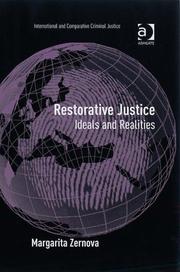
ISBN: 1315264870 1281208760 9786611208769 0754688313 9780754688310 1351965360 9781351965361 1351965336 9781351965330 9780754670322 0754670325 6611208763 140949599X 1138253081 1351965344 1351965352 135196531X 135115009X 1351150103 135115012X 1315264862 1351965328 9781315264875 9781281208767 6611208763 9781351150125 1351150111 9781351150095 9780853489460 9781351965323 9781315264868 9781351965316 9781351965347 9781138253087 Year: 2007 Publisher: Aldershot, Hants, England ; Burlington, VT : Ashgate,
Abstract | Keywords | Export | Availability | Bookmark
 Loading...
Loading...Choose an application
- Reference Manager
- EndNote
- RefWorks (Direct export to RefWorks)
This book provides a critical perspective on the aspirations of advocates of restorative justice and the direction in which restorative justice is developing. It examines ways forward for the restorative justice movement - and the development of practices - with a coherent set of restorative justice ideals.
Restorative justice. --- Reparation (Criminal justice) --- Punishment --- Corrections --- Criminals --- Victims of crimes --- Prisoners --- Reform of criminals --- Rehabilitation of criminals --- Alternatives to imprisonment --- Correctional services --- Penology --- Criminal justice, Administration of --- Compensation for victims of crime --- Criminal restitution --- Reparation --- Restitution (Criminal justice) --- Restitution for victims of crime --- Remedies (Law) --- Balanced and restorative justice --- BARJ (Restorative justice) --- Community justice --- Restorative community justice --- Philosophy. --- Rehabilitation. --- Legal status, laws, etc. --- Rehabilitation
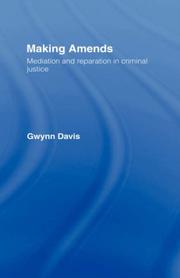
ISBN: 1134918518 1280338288 0203161017 9780203161012 0415067081 9781134918515 9781280338281 0415862132 9781134918461 9781134918508 9780415067089 9780415862134 113491850X Year: 1992 Publisher: London Routledge
Abstract | Keywords | Export | Availability | Bookmark
 Loading...
Loading...Choose an application
- Reference Manager
- EndNote
- RefWorks (Direct export to RefWorks)
Reparation, or making amends, is an ancient theme in criminal justice. It was revived in both Europe and North America in the 1980's as a practical alternative both to retributivism, and to the various utilitarian projects traditionally associated with retributive justice. Making Amends examines the practice of these schemes in the UK, USA, and Germany, and shows how criminal justice institutions were unresponsive to these attempts to cast justice in a new form. Yet the experiments reflected an abiding dissatisfaction with criminal courts and with the manner in which justice is conceived and...
Reparation (Criminal justice) --- Victims of crimes --- Mediation --- Criminal justice, Administration of --- Crime victims --- Victimology --- Victims --- Good offices (Mediation) --- Conflict management --- Dispute resolution (Law) --- Legal status, laws, etc. --- Law and legislation --- Legal status, laws, etc --- Compensation for victims of crime --- Criminal restitution --- Reparation --- Restitution (Criminal justice) --- Restitution for victims of crime --- Remedies (Law) --- Reparation (Criminal justice) - Great Britain. --- Victims of crimes - Legal status, laws, etc. - Great Britain. --- Mediation - Great Britain. --- Criminal justice, Administration of - Great Britain.
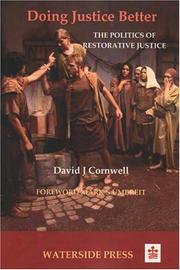
ISBN: 1281124435 9786611124434 190653411X 9781906534110 9781281124432 9781904380344 1904380344 6611124438 Year: 2007 Publisher: Winchester, UK Portland, Or. Waterside Pr. North American distributor ISBS
Abstract | Keywords | Export | Availability | Bookmark
 Loading...
Loading...Choose an application
- Reference Manager
- EndNote
- RefWorks (Direct export to RefWorks)
An uncompromising appraisal of the unique penal crisis affecting Britain and other Western-style democracies. Escalating resort to prisons, longer sentences, overcrowded and ineffective regimes, high rates of re-offending and eclectic penal policy all combine to fuel this crisis, whilst failing to reduce offending. In this new book, David J Cornwell, author of the acclaimed Criminal Punishment and Restorative Justice (ISBN 9781904380207), argues that the symptoms of this penal malaise are grounded in media sensationalism of crime and the need of politicians and their advisers to retain electoral credibility. Change is long overdue, but it requires a fresh, contemporary penology based on Restorative Justice. The book challenges the status quo, asks 'different questions' and places victims of crime at the centre of the criminal justice process.
Criminal justice, Administration of. --- Restorative justice. --- Criminals --- Reparation (Criminal justice) --- Compensation for victims of crime --- Criminal restitution --- Reparation --- Restitution (Criminal justice) --- Restitution for victims of crime --- Remedies (Law) --- Prisoners --- Reform of criminals --- Rehabilitation of criminals --- Corrections --- Alternatives to imprisonment --- Balanced and restorative justice --- BARJ (Restorative justice) --- Community justice --- Restorative community justice --- Criminal justice, Administration of --- Administration of criminal justice --- Justice, Administration of --- Crime --- Criminal law --- Rehabilitation. --- Rehabilitation --- Law and legislation --- Restorative justice
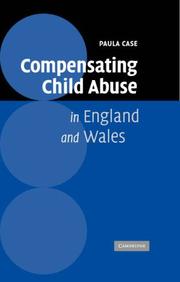
ISBN: 1107169224 1280815663 0511274777 0511494882 0511275471 0511273223 0511321007 0511274017 9780511274770 9780511275470 052186402X 9780521864022 9780511494888 9781107169227 9781280815669 9780511273223 9780511321009 9780511274015 Year: 2007 Publisher: Cambridge, UK New York Cambridge University Press
Abstract | Keywords | Export | Availability | Bookmark
 Loading...
Loading...Choose an application
- Reference Manager
- EndNote
- RefWorks (Direct export to RefWorks)
Providing a detailed analysis of the legal principles in England & Wales, this book looks at governing compensation claims for the lasting trauma caused by child abuse. Its pages discuss the merits and demerits of different forms of action as mechanisms for imposing liability for abuse, how compensable psychiatric damage can be proved and how the law deals with complex issues of duty of care, causation and extending limitation periods in the context of abuse cases. Whilst a substantial portion of the book deals with civil claims by the abused for the psychological harm caused by the abuse, coverage also extends to litigation by other parties involved directly or indirectly in abuse allegations. Also included is a significant comparative element, drawing upon jurisdictions such as Canada, Australia and New Zealand, as a means of speculating how our own legal system might develop.
Child abuse --- Set-off and counterclaim --- Compensation (Civil law) --- Counterclaim --- Recoupment --- Bills of particulars --- Civil procedure --- Extinguishment of debts --- Law and legislation --- Reparation (Criminal justice) --- Compensation for victims of crime --- Criminal restitution --- Reparation --- Restitution (Criminal justice) --- Restitution for victims of crime --- Remedies (Law) --- Abuse of children --- Child maltreatment --- Child neglect --- Children --- Cruelty to children --- Maltreatment of children --- Neglect of children --- Child welfare --- Family violence --- Parent and child --- Abused children --- Abuse of --- Crimes against --- Law --- General and Others
Book
ISBN: 0511698909 1107191548 1107402344 1282303120 9786612303128 0511595913 0511593368 0511596316 0511592434 0511595298 9780511596315 9780511596711 0511596715 9780521517928 9781107402348 0521517923 9780521517928 9781107402348 9780511698903 9781107191549 9781282303126 6612303123 9780511595912 9780511593369 9780511592430 9780511595295 Year: 2009 Publisher: Cambridge Cambridge University Press
Abstract | Keywords | Export | Availability | Bookmark
 Loading...
Loading...Choose an application
- Reference Manager
- EndNote
- RefWorks (Direct export to RefWorks)
Reparation programs seeking to provide for victims of gross and systematic human rights violations are becoming an increasingly frequent feature of transitional and post-conflict processes. Given that women represent a very large proportion of the victims of these conflicts and authoritarianism, it makes sense to examine whether reparation programs can be designed to redress women more fairly and efficiently and seek to subvert gender hierarchies that often antecede the conflict. Focusing on themes such as reparations for victims of sexual and reproductive violence, reparations for children and other family members, as well as gendered understandings of monetary, symbolic, and collective reparations, this text gathers information about how past or existing reparation projects dealt with gender issues, identifies best practices to the extent possible, and articulates innovative approaches and guidelines to the integration of a gender perspective in the design and implementation of reparations for victims of human rights violations.
Crimes against humanity. --- Reparation (Criminal justice) --- Women --- Feminist jurisprudence. --- Feminism, Legal --- Legal feminism --- Feminist theory --- Jurisprudence --- Crimes against women --- Femicide --- Women victims of crime --- Compensation for victims of crime --- Criminal restitution --- Reparation --- Restitution (Criminal justice) --- Restitution for victims of crime --- Remedies (Law) --- Crime --- International crimes --- Genocide --- War crimes --- Crimes against. --- Crimes against humanity --- Feminist jurisprudence --- Women (International law) --- International law --- Crimes against --- Legal status, laws, etc. --- Reparation (Criminal justice). --- Women (International law). --- Law --- General and Others
| Listing 1 - 10 of 20 | << page >> |
Sort by
|

 Search
Search Feedback
Feedback About UniCat
About UniCat  Help
Help News
News